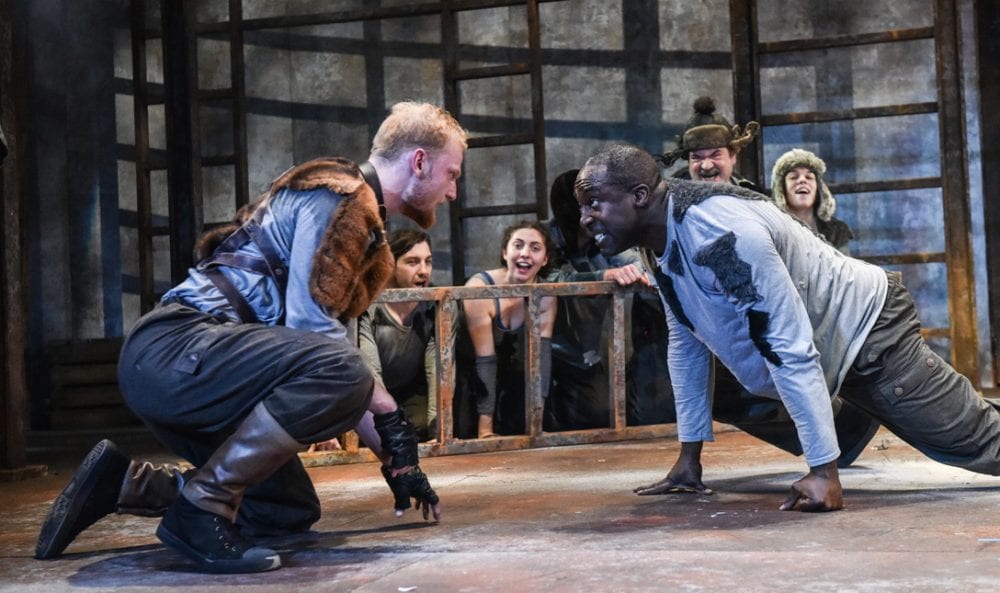Faithful Ruslan marks the centenary of the Russian revolution. To celebrate this occasion, Glasgow’s Citizens Theatre placed centre stage Stalin’s Gulag; that is, a play which recounts the trauma of a Russian concentration camp through the perspective of Ruslan – a guard dog. Max Keeble’s superb interpretation of the sensitive, faithful, and intelligent Ruslan makes us question who exactly are the ‘animals’. Indeed, it seems that the animals are the most humane and compassionate characters throughout the drama and the humans, the soldiers, the most brutal. The play captures this fine line in the very opening scene. With the whole cast on stage, each simultaneously switches in and out of human and animal roles following the Masters commands: ‘Prisoners! Soldiers! Dogs!’
Adapting a play from a novel is no easy task for any writer and Faithful Ruslan, overall, portrays the main events well. One of the most impressive features of the play is the treatment of time. The flashbacks to Ruslan’s past, including his fond memories growing up, manage to provide some relief from the horrors of the prison camps. What is especially impressive is the use of Grammelot during some episodes (a type of gibberish language reminiscent of the tradition of the Commedia dell’arte). This invented language could have fooled any non-Russian speaker in the audience. It is not until the speeches of the young communists that we are able to recognize that this is no ordinary spoken Russian but an onomatopoeic-type idiom with the odd word pronounced in English. However clever this is, what might hinder the use of language on stage are the different accents. While the Master (Martin Donaghy) adopts his natural Scottish accent, the Shabby Man (Paul Brennan) uses cockney English, so the switching in-and-out of the different accents potentially impedes our understanding.
For those unfamiliar with the novel, the adaptation risks losing the audience at various points of the play, despite the use of surtitles contextualizing the drama every so often. One such moment includes the opening scene of the second act where one of the female inmates, performed by Isabelle Joss, is woken up by the Chief Master, played by Mark Jax, and made to satisfy the needs of the male prisoners. Horrified by this, she vomits into a bucket but she vomits coins. Is she therefore a victim of a sexual attack or is she being paid for her ‘services’? Further, during the revolt scene, without a detailed understanding of the historical facts, it is, once more, unclear who is plotting what and why the commanders later freeze the inmates with a hosepipe. Another episode which could also cause confusion is the brief use of a modern-day rap by the only black actor in the cast, Vinta Morgan. For a play attempting to be so faithful to both novel and the historical facts, is this really necessary?
Despite these shortcomings (and the length of the play), the actors’ performances were on point. The close bonds between the dogs and the dog instructor, interpreted by Hunter Bishop, as well as between Ruslan, the Master, and the Shabby Man, are particularly moving. This is a unique and original play, adapted from a fascinating novel, rescued by the acting.

